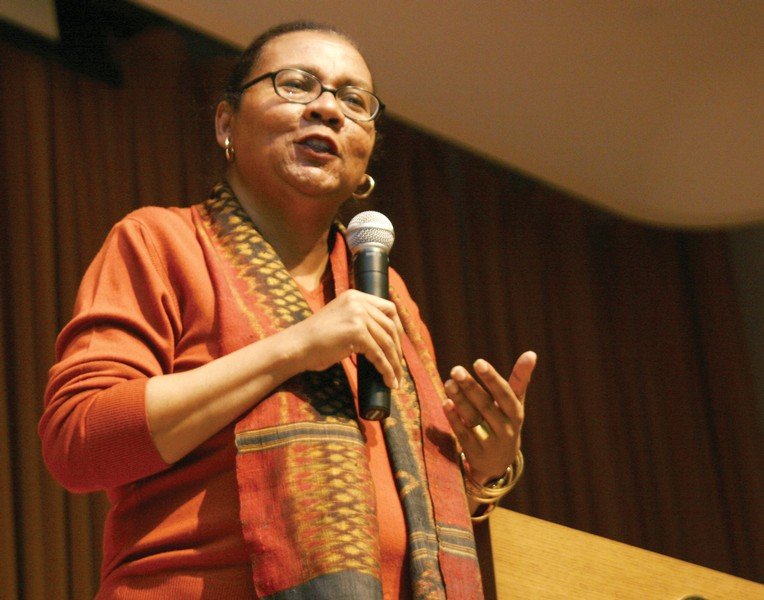Column: Mourning intersectional feminist and author, bell hooks
Columnist Sarah Cook talks about the recent death of bell hooks, an intersectional feminist and icon of self-naming. bell hooks photo courtesy Cmongirl, Public domain, via Wikimedia Commons
bell hooks, known for blending radical empathy with fierce social criticism, passed away in December 2021
By Sarah Cook
bell hooks, intersectional feminist extraordinaire and icon of self-naming, passed away on December 15, 2021 at her home in Berea, Kentucky. She was 69 years old.
Though born as Gloria Jean Watkins on September 25, 1952, at the start of her career hooks adopted the name of her maternal great grandmother, and then declined traditional rules of grammar by refusing to capitalize either her first or last name (leave it to a radical feminist to reject even the most benign instances of proper etiquette). When speaking about this choice, hooks expressed her commitment to focusing on the “substance of books, not who I am.” Indeed, much of her writing on love and relationships is built on this type of communal attitude, where ego and competition are made scarce in order to invite a fuller scope of fellowship and collaboration.
The Twittersphere and other online platforms reacted with their usual burst of grief at the news of hooks’ passing, before doing what social media does best: holding space for immediate celebration, remembrances, and the spontaneous overlay of hooks’ wise words on striking photographs, images, and illustrations.
hooks was the author of numerous publications, including her first book, the groundbreaking Ain’t I a Woman?: Black women and feminism, published in 1981, and other works that examine issues of social justice, the marginalization of black female experiences, and the power and limitations of our current education system. She gave ruthless voice to the profound and complex experiences of moving through racism and sexism simultaneously, advocating for the ways that healing and inclusion go hand in hand, exclaiming that “rarely, if ever, are any of us healed in isolation. Healing is an act of communion.”
hooks’ work spans a variety of genres and mediums: in addition to her major publications, she also lectured, wrote children’s books, created and contributed to a handful of films, and delivered a commencement speech in 2002 to the graduating students at Southwestern University. She was beloved as a teacher, poet, and political theorist, and she brought unapologetic criticism to the systems that work to keep us simultaneously down and separated, whether these systems are influenced by racism, classism, sexism, or all three—and more. (Often: all three and more.)
“For me, forgiveness and compassion are always linked: how do we hold people accountable for wrongdoing and yet at the same time remain in touch with their humanity enough to believe in their capacity to be transformed?” ~bell hooks
Her intersectional stance, focused as it was on highlighting the diversity of histories, barriers, and unique lived experiences of black women, pulled feminism tenderly but firmly in the direction of inclusion and solidarity. A stronger political movement, hooks argued, would be the result of correcting for a history that conflated feminism with white feminism, and that failed to do the work of accounting for its blind spots and its own privileges.
My own first encounter with hooks’ work was in a grad school seminar in 2013, and I regret that it took being in such an exceptional space for me to discover the fierce intelligence and radical accessibility that is her perspective. I read All About Love for a classroom assignment, and suddenly I had a larger vocabulary with which to examine my participation in my most intimate relationships. It was from her that I learned about the absolute importance of healthy solitude, the way being alone with myself in a safe and affectionate way would allow me, in turn, to "be with others without using them as a means of escape.”
And it was also from hooks that I learned to distinguish that fundamental four letter word, “love,” from its destructive doppelgänger, “cathexis,” the latter of which is defined by Merriam-Webster as the “investment of mental or emotional energy in a person, object, or idea.” Seen through hooks’ close study, this means distinguishing between love as a feeling versus love as an act, and entering relationships of any kind with a framework built on nurturing over rescuing, on witnessing over assumption. The daunting and implicit expectations we sometimes have of our loved ones interfere with our ability to care for them, let alone for ourselves; I would not have the framework for attempting to embody this way of living, loving, and showing up if it were not for bell hooks.
In a conversation with Maya Angelou in 1998, hooks said the following: “For me, forgiveness and compassion are always linked: how do we hold people accountable for wrongdoing and yet at the same time remain in touch with their humanity enough to believe in their capacity to be transformed?” So that empathy—real, uninhibited empathy—means believing in our shared capacity for messing up, and then, with love, doing better. It means valuing the hope that exists precisely on the other side of accountability and hard work.
New, curious, and dedicated admirers alike who desire to know more about bell hooks can start by reviewing this collection of quotes, listening to this talk about family dynamics within patriarchy, and watching this brilliant clip of her and Laverne Cox defining feminism.

